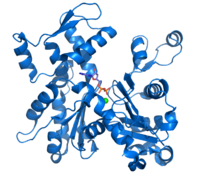
Photo from wikipedia
Cytoskeletal proteins are beginning to be considered as key regulators of nuclear function. Among them, actin and myosin have been implicated in numerous tasks, including chromatin regulation, transcription and assembly… Click to show full abstract
Cytoskeletal proteins are beginning to be considered as key regulators of nuclear function. Among them, actin and myosin have been implicated in numerous tasks, including chromatin regulation, transcription and assembly of nascent ribonucleoprotein complexes. We also know from work performed by several labs that influx of actin and myosin into the nucleus and out of the nucleus is tightly regulated. In particular, in the case of actin, its nucleocytoplasmic import/export cycle is controlled by the importin/exportin system and it correlates with the transcriptional state of the cell. These basic molecular functions of both actin and myosin seem to impact key cellular functions, including development and differentiation as well as the cellular response to DNA damage by directly affecting transcriptional reprograming. These observations are beginning to suggest that actin and myosin could play an important role in consolidating the organization of the mammalian genome and that loss of actin and myosin likely leads to a general instability of the genome. In this chapter, we provide a general background on evidence that actin and myosin are important in key nuclear functions. Following this, we will focus on evidence supporting of a role in genome organization and finally we will discuss increasingly striking results on the role of actin and myosin in the maintenance of genome integrity.
Journal Title: International review of cell and molecular biology
Year Published: 2020
Link to full text (if available)
Share on Social Media: Sign Up to like & get
recommendations!